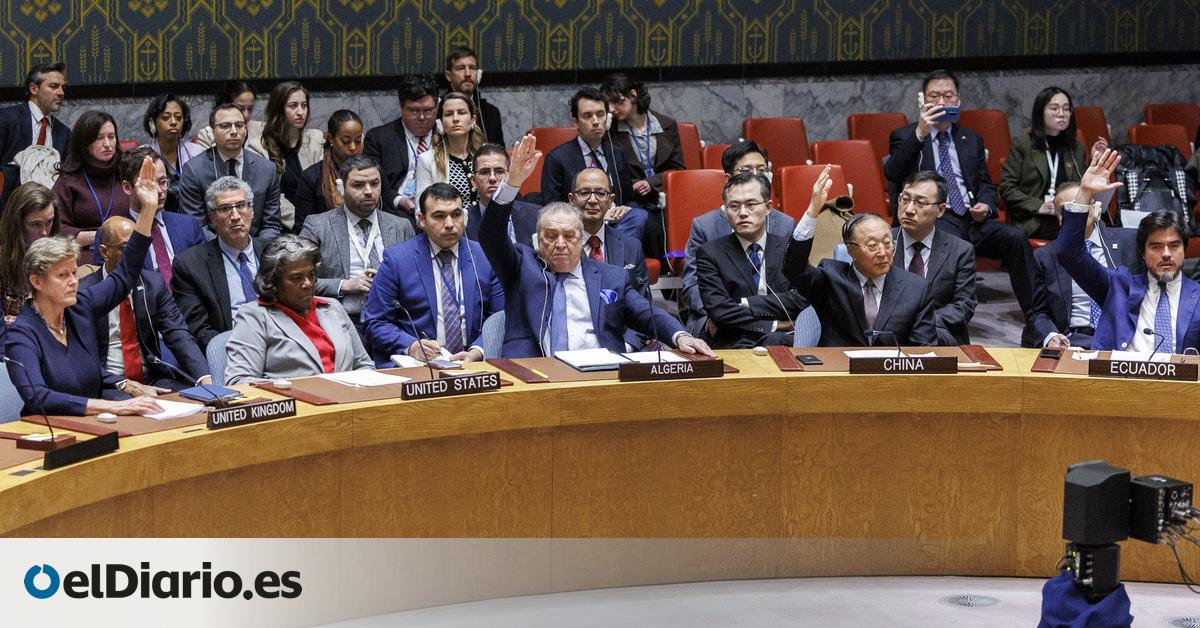
The UN Security Council approved a resolution on Monday demanding an immediate ceasefire in Gaza during the Muslim holy month of Ramadan. The resolution, presented by the 10 non-permanent members of the Council, was adopted with the abstention of the United States. “This resolution must be implemented. Failure would be unforgivable,” UN Secretary General Antonio Guterres wrote in X.
A few minutes after knowing the result, the Prime Minister of Israel, Benjamin Netanyahu, canceled the visit of two of his main advisors to Washington this week because the US has not used its veto right. “The United States did not veto today the new text that calls for a ceasefire without the condition of releasing the kidnapped people. “This is a clear retreat from his consistent position on the Security Council since the beginning of the war,” read a statement from the prime minister’s office.
“We applaud the decision of the UN Security Council to finally demand an immediate ceasefire in Gaza. It is urgent that large-scale humanitarian aid comes in and all hostages are released. The violence that causes so many deaths and so much suffering must end,” commented the Spanish Minister of Foreign Affairs, José Manuel Albares. The Government of Israel had attacked this Monday against the President of the Spanish Government Pedro Sánchez for his position on the recognition of the Palestinian State, after last Friday Spain, Malta, Slovenia and Ireland agreed on a joint declaration in which they commit to giving the necessary steps to recognize Palestine “when it can make a positive contribution and the right circumstances are met.”
Weeks of crossed vetoes
The Council was scheduled to meet last Saturday to vote on a new resolution on Gaza, but postponed the meeting until this week, after Russia and China vetoed another text presented by the United States on Friday.
The resolution voted on demands “an immediate ceasefire for the month of Ramadan” – which is expected to end on April 9. In parallel, it calls for the “immediate and unconditional release” of all hostages held by the Palestinian group Hamas and underlines the need to “expand the flow of humanitarian aid,” to respond to the “great concern about the catastrophic humanitarian situation in Gaza.” .
The resolution has been presented by the 10 non-permanent members of the Council and had the support of Russia, China and the Arab Group of the United Nations. Israel and Yemen as well as the Observer State of Palestine participated in the Council meeting. One sticking point has been the removal of the word “permanent” from an earlier version of the draft. Now he calls for an “immediate ceasefire.”
China had affirmed this Monday that it “will continue to support” the United Nations Security Council to adopt “responsible and meaningful actions” to achieve an “unconditional and lasting” ceasefire in Gaza.
However, it was not clear what the position of the United States would be, which as a permanent member has veto power, a power it has already exercised three times regarding the war in Gaza. The US, an ally of Israel, had maintained that the resolution could harm negotiations to end hostilities between the United States, Egypt and Qatar.
U.S. Ambassador and Permanent Representative Linda Thomas-Greenfield has said that by adopting the resolution, the Security Council “stands in support” of diplomatic efforts to achieve an immediate and sustainable ceasefire, ensure the immediate release of all hostages and help alleviate the suffering of needy Palestinian civilians in Gaza. “The United States fully supports these critical goals,” she said.
“Victim of enormous geopolitical divisions”
Guterres had assured this Monday before the vote that the UN Security Council is “a victim of the enormous geopolitical divisions” in the world and had called for the approval of the resolution calling for a ceasefire in Gaza.
“The Security Council is today a victim of the enormous geopolitical divisions that exist in the world. With the superpowers at odds with each other, and creating a situation in which it is very difficult to find consensus in relation to any of the difficult crises we face in the world, not only in relation to Gaza,” declared the head of the UN at a press conference in Amman.
Together with the Jordanian Foreign Minister, Ayman Safadi, Guterres has expressed that, for this reason, it is “so important that the Security Council is finally able to approve a resolution calling for a ceasefire in Gaza.”
“It is our duty to do everything possible to mobilize the entire international community. And I see a consensus emerging in the international community. Even in friendly and allied countries of Israel. I see a consensus emerging that this war must end. “I see a consensus emerging that any ground offensive against Rafah would lead to a catastrophic humanitarian situation,” he noted.
According to the Gaza Health Ministry, since October 7, the Israeli offensive in the Palestinian enclave has killed more than 32,000 Palestinians, two-thirds of whom were women and children.
With information from EFE.
Source: www.eldiario.es

